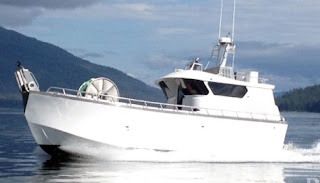I have had some personal experiences with sharks. I learned to scuba dive in the Red Sea in Egypt, and we always saw reef and hammerhead sharks. Every time I have seen one while in the water, they have turned tail and swam away. When I was growing up in Washington State, we would catch small sand sharks, which we called dogfish. They were more of a nuisance than dangerous. When fishing for Salmon, they would try to eat the fish you had hooked.
During my high school years, I commercial fished with a friend with his own Gillnet fishing boat, a 28-foot bow picker with a big spool in the middle of the deck to hold the net. This boat was fast; it had a 350 Chevy engine with a Volvo-Penta outdrive and would make 30 knots on a flat sea. Gill netting for Salmon is always done at night with an 1800-foot long, 300-foot deep Gillnet laid out by backing the boat with the net coming off the spool. All gillnetting in Washington state is done at night. Once the net is in the water, you tow it straight with the boat.
Every once and a while, a sand shark or skate would get tangled in the net. When picking up the net, the hydraulic motor for the net spool started to slow and strain. The net coming through the roller horns used to guide the net back onto the spool; suddenly, a big black object filled the space in the roller horns. It must have been a 5' by 6' triangle; it popped through the Roller Horns and slammed onto the deck.
It scared the bejesus out of us. It was a big skate; we both grabbed gaff hooks and proceeded to gaff it several times out of fear. After throwing it overboard, we pick up the net and reset it. We would do this two or three times a night. Every night fishing, something unexpected would always happen. One night something extraordinary happened.
After putting the net in the water, we were in the cabin listening to the radio traffic from all the different fishing boats. Suddenly a fisherman's voice came on the radio with a frantic sound. Taking to another fisherman, he said something big was caught in his net. He hoped someone would come over to help get it out of his net.
Listening to his position, we realized that he was pretty close. So we picked up the net and ran over to him. With our spotlight, we could see it was big, so long that its tail was sticking up behind his boat. It must have been 30 feet long or more. We could see that the net was wrapped around it several times. It wasn't moving, so we thought it was dead. After discussing what to do, he cut the net and ran to the other end. Pick the rest of the net to the object. Nets are expensive, so it requires some thought before cutting a 10K dollar gillnet. After cutting the net the second time, the big fish just sank.
To this day, we don't know what it was. It looked like a shark. It was long and gray without scales. It could have been a great white or a whale Shark. Sharks have to constantly swim to live to keep water flowing over their gills. The whole episode was an experience, to say the least. It is one of those surreal experiences tucked into a memory that resurfaces occasionally.


